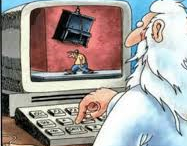Eighteenth Sunday in Ordinary Time
“I am the bread of life; whoever comes to me will never hunger, and whoever believes in me will never thirst.” Jn: 6:35
No one can ever accuse the Bible of exaggerating the goodness of people.
Quite the contrary!
It seems to go out of its way to highlight the sinners, the very imperfect, the seriously flawed.
Today’s reading from the Book of Exodus (16:2-4, 12-15) is a classic.
The story begins right after God, through Moses’ leadership, has delivered the Israelites from 400 years of slavery in Egypt.
400 years! That’s nearly twice as long as our nation has existed.
We all remember this saga. It’s the central story of the entire Hebrew Bible, or what we call the “Old Testament.”
Even if you haven’t read the story, most of you have certainly watched the movie, The Ten Commandments. How can you ever forget the scene that brilliantly captured the frightening race to the Red Sea with the evil Egyptians hurrying after them?
Or how can any of us who watched the movie ever forget how Charlton Heston, in his epic role as Moses, led the Israelites through the Red Sea by parting the waves in the most dramatic fashion so that the Israelites running for freedom are left dry as a bone, while the wicked Egyptians in their horses-drawn chariots drowned.
Down to the last man.
A miraculous event by any standard.
Today’s first reading begins right after this spectacularly thrilling story of escape. And what does it tell us?
It tells us this: no sooner than the Israelites were rescued in this most dramatic and memorable way, they began to do three things – complain, grumble and whine.
Seriously!
They didn’t have enough to eat. The weather was too hot. They missed their former way of life … as slaves!
But, what’s maybe even more amazing is that God did not do what you and I would have done were we “God” in that situation.
He didn’t guilt trip them, as in, “After all I’ve done for you ….”
He didn’t threaten them with abandonment, as in, “That’s it. I’ve had it with you people. I’m done.”
He didn’t punish them, as in, “OK, just for that ….”
How many times do we hear ourselves saying exactly those words?
Instead of any kind of pettiness or spite, the God of Moses sends this thankless, ungrateful group of people … a gift!
The gift of manna.
“This is the bread that the Lord has given you to eat.”
In today’s gospel, Jesus does the same. Only it is no longer manna he gives us to eat. It is no longer a substance that will address only our material need.
It is his very own self:
“I am the bread of life; whoever comes to me will never hunger, and whoever believes in me will never thirst.”
Look closely at what Jesus is doing. He is reaching out to us, sending each one of us a gift, just as God did so long ago. Only this time the gift is on two levels: the material and the spiritual.
Material hunger is a major issue in our world.
Millions of people, most critically, millions of children go hungry every day. The biggest cause for this tragic situation is poverty. In the United States of America, for example, more than 45 million people live in poverty. The number of poor people in the US is now the largest in the 52 years for which poverty statistics have been published.
Jesus wants to feed those people. Literally feed them. Materially feed them.
And then there’s the spiritual dimension. An area in which we can all plead poverty and hunger.
St. Paul speaks to this dimension powerfully in today’s second reading. Listen again:
“… you should put away the old self of your former way of life, corrupted through deceitful desires … and put on the new self, created in God’s way … in holiness of truth.”
The “new self.”
In a single word, Paul is talking about conversion.
A change of hearts. A deepening of spirit. A reversal of values.
The “reversal” Paul is begging us to embrace is:
Replace all your complaining with gratitude; replace all your grumbling with trust in God’s boundless mercy; replace all your whining with action, service, and a focus on the “poverty stricken.”
How can we possibly accomplish this?
By consuming the “bread of life.” By “eating” his Word and “digesting” his Spirit. By making the “bread” that is Jesus the food that nourishes us and strengthens us and satisfies our deep hunger for beauty and goodness.
By allowing our Eucharistic experience, today, right now, to resonate in the deepest recesses of our hearts and minds so that we can begin to think and see and hear in a way different than we do now.
Conversion.
That’s what Jesus is talking about. A conversion that takes us w-a-y beyond the mere material, as important as that is; a conversion that helps us deepen our life in the Lord; a conversion that pushes us out of ourselves and into the world so that we can do as he told us to do: feed the hungry and give drink to the thirsty.
“I am the bread of life; whoever comes to me will never hunger, and whoever believes in me will never thirst.”
Ted Wolgamot, Psy.D.
11809194.1
8/2/18





